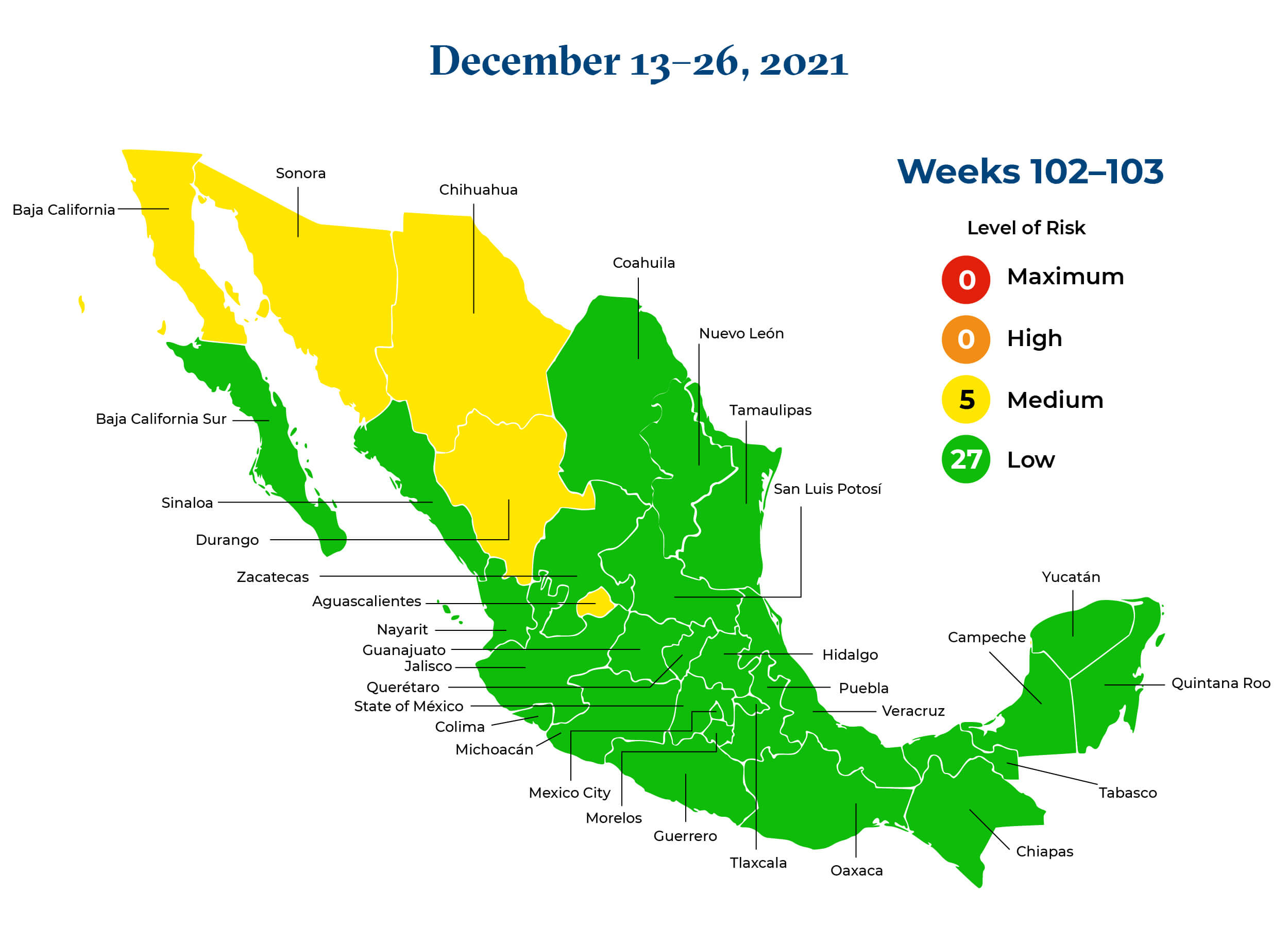The COVID-19 Omicron variant has resulted in a slight increase in the rate of infection in Mexico, but the federal government has deemed all of the nation’s 32 states safe to remain open for business, although with cautions for a few of the states.
Under guidance provided under the federal pandemic traffic light monitoring system, Aguascalientes, Baja California, Chihuahua, Durango, and Sonora are designated under yellow status, at which point residents are urged to take preventative measures to ensure that high-risk individuals are not infected. The federal government is also urging residents in the rest of the country to reduce the spread of COVID-19 by complying with preventative measures, especially during the busy holiday season.
The monitoring system, which is updated every other week, was implemented in June 2020, and is used to alert residents to the epidemiological risks of COVID-19 and provide guidance on restrictions on certain activities in each of the country’s states. Below is a map for the period of December 13, 2021, through December 26, 2021, indicating the COVID-19 risk level in each of the states and the capital.
This chart presents the traffic light status of each state, and, as applicable, variations between federal and local traffic light statuses based on publications of the federal Ministry of Health and status reports provided by each state. Some states may impose restrictions that vary from the federally designated status restrictions, or may even designate regions or municipalities at different statuses. The Puebla state government, for example, designated five of its regions in yellow status, but the sixth, home to the state capital of Puebla, is in orange status, the second most restrictive status under both federal and government guidance. And in Sonora, the state government has designated most of its municipalities in yellow status, but Nogales, across the border from Nogales, Arizona, is in orange status.
Vaccinations
As of December 20, 2021, 88 percent of Mexico’s adult population had been vaccinated against COVID-19 in Mexico, although the federal government has not clarified the percentage of people who have been fully vaccinated. However, some state governments, such as Aguascalientes, are providing a breakdown of the data, noting how many people have been partially or fully vaccinated, as well as hospitalization and mortality rates for those who are unvaccinated, partially vaccinated, and fully vaccinated.
Chiapas, Jalisco, Mexico City, Oaxaca, the State of Mexico, Sinaloa, and Yucatan are offering booster shots for residents, giving priority to vulnerable people. In Baja California, vaccinations are now being provided for residents 14 years of age.
Mexico City Still in Green Status
The nation’s capital entered green status in early November, and remains open for business without restrictions as the year draws to a close, according to the Mexico City Monitoring Committee’s latest update to the Epidemiological Traffic Light for Mexico City. The committee has not updated the guidelines for private corporate offices, so employers may want to continue to limit the percentage of employees working on-site to 80 percent, in accordance with Mexico City’s industry-specific health protection guidelines. The guidelines also require employers to conduct at their own expense and on a weekly basis, rapid antigen tests or reverse transcription polymerase chain reaction (RT-PCR) tests for the detection of the SARS-CoV-2 virus, to at least 20 percent of the personnel attending work on-site.
Finally, the Administrative Verification Institute and other Mexico City government authorities will continue to visit businesses to verify compliance with the general and specific workplace health protection measures. Employers found to be out of compliance with the measures may be subject to fines, the total or partial temporary suspension of the work center for up to 15 calendar days, and other applicable sanctions. (Authorities in other areas, such as Baja California Sur, have also announced that they are actively investigating business establishments to ensure compliance with health protocols.)
Ogletree Deakins will continue to monitor and report on developments with respect to the COVID-19 pandemic and will post updates in the firm’s Coronavirus (COVID-19) Resource Center as additional information becomes available. Important information for employers is also available via the firm’s webinar and podcast programs.








